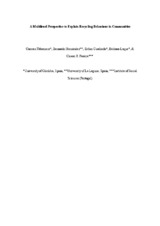Mostrar el registro sencillo del ítem
A multilevel perspective to explain recycling behaviour in communities
| dc.contributor.author | Tabernero Urbieta, Carmen | |
| dc.contributor.author | Hernández, Bernardo | |
| dc.contributor.author | Cuadrado, Esther | |
| dc.contributor.author | Luque Salas, Bárbara | |
| dc.contributor.author | Pereira, Cicero | |
| dc.date.accessioned | 2024-02-02T07:38:39Z | |
| dc.date.available | 2024-02-02T07:38:39Z | |
| dc.date.issued | 2015 | |
| dc.identifier.uri | http://hdl.handle.net/10396/26973 | |
| dc.description.abstract | Previous research on the motivation for environmentally responsible behaviour has focused mainly on individual variables, rather than organizational or collective variables. Therefore, the results of those studies are hardly applicable to environmental management. This study considers individual, collective, and organizational variables together that contribute to the management of environmental waste. The main aim is to identify, through the development of a multilevel model, those predictive variables of recycling behaviour that help organizations to increase the recycling rates in their communities. Individual (age, gender, educational level, self-efficacy with respect to residential recycling, individual recycling behaviour), organizational (satisfaction with the quality of the service provided by a recycling company), and collective (community recycling rates, number of inhabitants, community efficacy beliefs) motivational factors relevant to recycling behaviour were analysed. A sample of 1501 residents from 55 localities was surveyed. The results of multilevel analyses indicated that there was significant variability within and between localities. Interactions between variables at the level of the individual (e.g. satisfaction with service quality) and variables at the level of the collective (e.g. community efficacy) predicted recycling behaviour in localities with low and high community recycling rates and large and small populations. The interactions showed that the relationship between self-efficacy and recycling is stronger in localities with weak community efficacy beliefs than in communities with strong beliefs. The findings show that the relationship between satisfaction with service quality and recycling behaviour is stronger in localities with strong community efficacy beliefs than in communities with weaker beliefs and a smaller population. The results are discussed accordingly in relation to theory and possible contribution to waste management. Those findings may be incorporated in national and international environmental policies in order to promote environmentally responsible behaviour in citizenship. | es_ES |
| dc.format.mimetype | application/pdf | es_ES |
| dc.language.iso | eng | es_ES |
| dc.publisher | Elsevier | es_ES |
| dc.rights | https://creativecommons.org/licenses/by-nc-nd/4.0/ | es_ES |
| dc.source | Tabernero, C., Hernández, B., Cuadrado, E., Luque, B., & Pereira, C. R. (2015). A multilevel perspective to explain recycling behaviour in communities. Journal of Environmental Management, 159, 192-201. https://doi.org/10.1016/j.jenvman.2015.05.024 | es_ES |
| dc.subject | Multilevel | es_ES |
| dc.subject | Self-efficacy | es_ES |
| dc.subject | Community efficacy | es_ES |
| dc.subject | Satisfaction with service quality | es_ES |
| dc.subject | Recycling behaviour | es_ES |
| dc.title | A multilevel perspective to explain recycling behaviour in communities | es_ES |
| dc.type | info:eu-repo/semantics/article | es_ES |
| dc.relation.publisherversion | https://doi.org/10.1016/j.jenvman.2015.05.024 | es_ES |
| dc.relation.projectID | Gobierno de España. PSI2009-07423 | es_ES |
| dc.relation.projectID | Gobierno de España. PSI2014-58609-R | es_ES |
| dc.relation.projectID | Gobierno de España. PSI2009-08896 | es_ES |
| dc.rights.accessRights | info:eu-repo/semantics/openAccess | es_ES |

